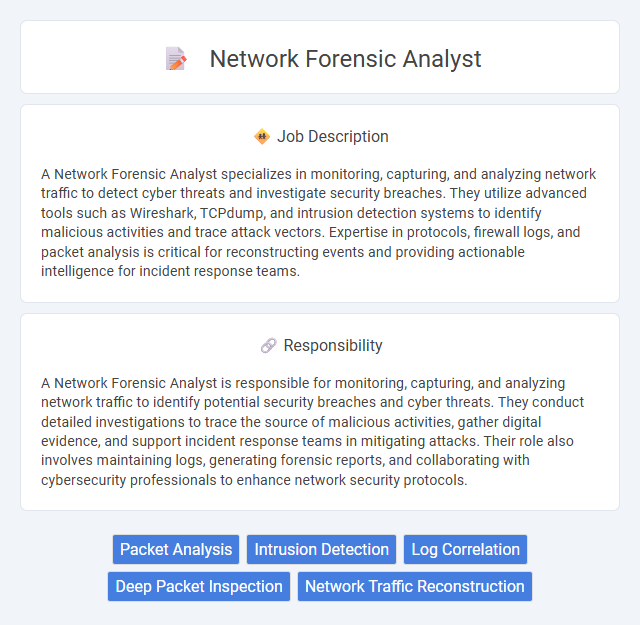
A Network Forensic Analyst specializes in monitoring, capturing, and analyzing network traffic to detect cyber threats and investigate security breaches. They utilize advanced tools such as Wireshark, TCPdump, and intrusion detection systems to identify malicious activities and trace attack vectors. Expertise in protocols, firewall logs, and packet analysis is critical for reconstructing events and providing actionable intelligence for incident response teams.
Individuals with strong analytical skills and a high level of curiosity will likely find a career as a network forensic analyst suitable, as the role demands thorough investigation of cyber incidents. People who enjoy problem-solving, working under pressure, and have a keen eye for detail are probably well-suited for this job. Those uncomfortable with continuous learning or dealing with complex technical environments might face challenges in this field.
Qualification
Network forensic analysts require strong expertise in cybersecurity, digital forensics, and network protocols. Proficiency with tools like Wireshark, EnCase, and Splunk is essential for analyzing network traffic and identifying security breaches. Relevant certifications such as Certified Ethical Hacker (CEH), GIAC Network Forensic Analyst (GNFA), and CompTIA Security+ significantly enhance a candidate's qualifications.
Responsibility
A Network Forensic Analyst is responsible for monitoring, capturing, and analyzing network traffic to identify potential security breaches and cyber threats. They conduct detailed investigations to trace the source of malicious activities, gather digital evidence, and support incident response teams in mitigating attacks. Their role also involves maintaining logs, generating forensic reports, and collaborating with cybersecurity professionals to enhance network security protocols.
Benefit
Network forensic analyst roles probably offer significant benefits such as enhanced cybersecurity skills and the ability to detect and prevent cyber threats effectively. This position may provide valuable experience in analyzing network traffic and digital evidence, which could lead to career advancement opportunities in cybersecurity. Working as a network forensic analyst might also grant access to competitive salaries and job stability due to the increasing demand for cybersecurity professionals.
Challenge
Network forensic analysts likely face the challenge of rapidly evolving cyber threats that require continuous learning and adaptation to new attack vectors. They probably encounter the complexity of analyzing vast amounts of network data to identify subtle indicators of compromise while maintaining data integrity. The role may demand high-pressure decision-making to respond quickly and accurately during security incidents, with a strong emphasis on attention to detail and problem-solving skills.
Career Advancement
Network forensic analysts specialize in investigating cyber incidents by capturing, analyzing, and preserving network data to uncover evidence and identify threats. Career advancement in this field often leads to roles such as cybersecurity consultant, incident response manager, or digital forensics expert, with opportunities to gain certifications like CISSP, CEH, and GIAC. Expertise in advanced network protocols, malware analysis, and threat intelligence significantly enhances prospects for senior positions and leadership roles in cybersecurity operations.
Key Terms
Packet Analysis
Network forensic analysts specialize in packet analysis to investigate and monitor data traffic for signs of cyber threats, malicious activity, and intrusions. They utilize tools such as Wireshark, tcpdump, and network protocol analyzers to capture, decode, and interpret network packets, identifying anomalies and reconstructing events. Expertise in protocols like TCP/IP, HTTP, and DNS is essential for accurately tracing attack vectors and supporting incident response efforts.
Intrusion Detection
Network forensic analysts specialize in intrusion detection by systematically capturing, monitoring, and analyzing network traffic to identify suspicious activities and potential cyber attacks. They employ advanced intrusion detection systems (IDS) and deep packet inspection techniques to uncover hidden threats, trace attack origins, and collect digital evidence for incident response. Proficiency in protocols such as TCP/IP, knowledge of malware behaviors, and expertise in log correlation are critical for accurately detecting and mitigating network intrusions.
Log Correlation
A Network Forensic Analyst specializing in log correlation systematically aggregates and analyzes diverse network logs, including firewall, intrusion detection system (IDS), and server logs, to identify patterns indicative of security incidents. This role leverages advanced correlation engines and machine learning algorithms to detect anomalies, trace attack vectors, and reconstruct cyberattack timelines. Proficiency in Security Information and Event Management (SIEM) platforms like Splunk or IBM QRadar is essential for extracting actionable intelligence and supporting incident response efforts.
Deep Packet Inspection
A Network Forensic Analyst specializing in Deep Packet Inspection (DPI) monitors and analyzes network traffic at a granular level to detect anomalies, intrusions, and malicious activities. Utilizing advanced DPI tools, the analyst examines packet payloads beyond header information, enabling identification of hidden threats and encrypted communications. This role is critical in enhancing cybersecurity by providing detailed insights into network behavior, supporting incident response, and ensuring compliance with data protection regulations.
Network Traffic Reconstruction
Network forensic analysts specialize in network traffic reconstruction to identify, analyze, and interpret data packets traversing communication networks, enabling detection of cyber threats and security breaches. They employ sophisticated tools and techniques to capture, reassemble, and examine network traffic logs, revealing patterns that help trace malicious activities and unauthorized access points. Expertise in protocols such as TCP/IP, HTTP, and DNS is essential for accurately reconstructing transmission flows and supporting incident response efforts.
 kuljobs.com
kuljobs.com